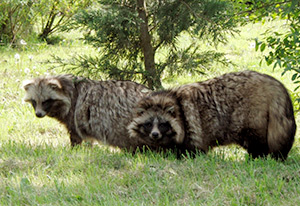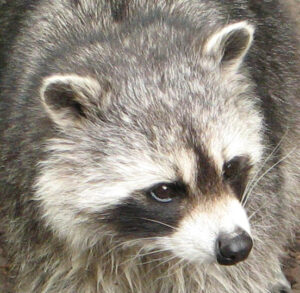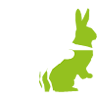Research into the public health risk posed by raccoon dogs and raccoons to continue in 2016
Help us by reporting finding a dead raccoon or raccoon dog

Raccoon dogs, Photo: Jaap Mulder
Raccoon dogs (Nyctereutes procyonides) and raccoons (Procyon lotor) are spotted with increasing frequency around the Eastern border of the Netherlands. Both animals can carry pathogens that can cause disease in humans. For example, raccoon dogs may be infected with Trichinella spiralis and Echinococcus multilocularis (also known as the fox tapeworm) parasites, and raccoons may carry Baylisascaris procyonis (raccoon roundworm). In addition, both species can be infected with the virus that causes rabies, however, as this has been succesfully controlled and eradicated from most countries in Western Europe the threat posed by this pathogen is likely to be small.
The National Institute for Public Health and the Environment (RIVM) is carrying out research about the raccoon/ raccoon dog parasites that can be transmitted to humans. In 2014-2015 nine raccoon dogs were investigated and one was found to be carrying Trichinella and another was infected with fox tapeworm. In addition, the Dutch Wildlife Health Centre (DWHC) found raccon roundworm in two raccoons that were submitted at the end of 2014 for post-mortem exam.

Raccoon
Based on these findings, the RIVM will continue to investigate the incidence of Trichinella and Echinococcus in raccoon dogs and of Baylisascaris procyonis in raccoons, throughout 2016. As part of this project, the DWHC will perform post-mortem on the submitted animals to identify other infectious disaeses affecting these sepcies. Other research partners, (Bureau Mulder-natuurlijk, Altenburg & Wymenga, and the Zoogdiervereniging), will investigate the ecology of the raccoon dog in the Netherlands.
What to do if you find a dead raccoon or raccoon dog
In order to help this project please report finding a dead raccoon or raccoon dog via the submission form on our website or by calling the DWHC on 030 – 253 79 25. After submitting your form you will be contacted by the DWHC who will advise you on how to package the cadaver and arrange collection of the package from your home or place of work.
Questions regarding this project can be directed to miriam.maas@rivm.nl
Authors: Miriam Maas1, Margriet Montizaan2
1 Rijksinstituut voor Volksgezondheid en Milieu (RIVM)
2 Dutch Wildlife Health Centre (DWHC)



